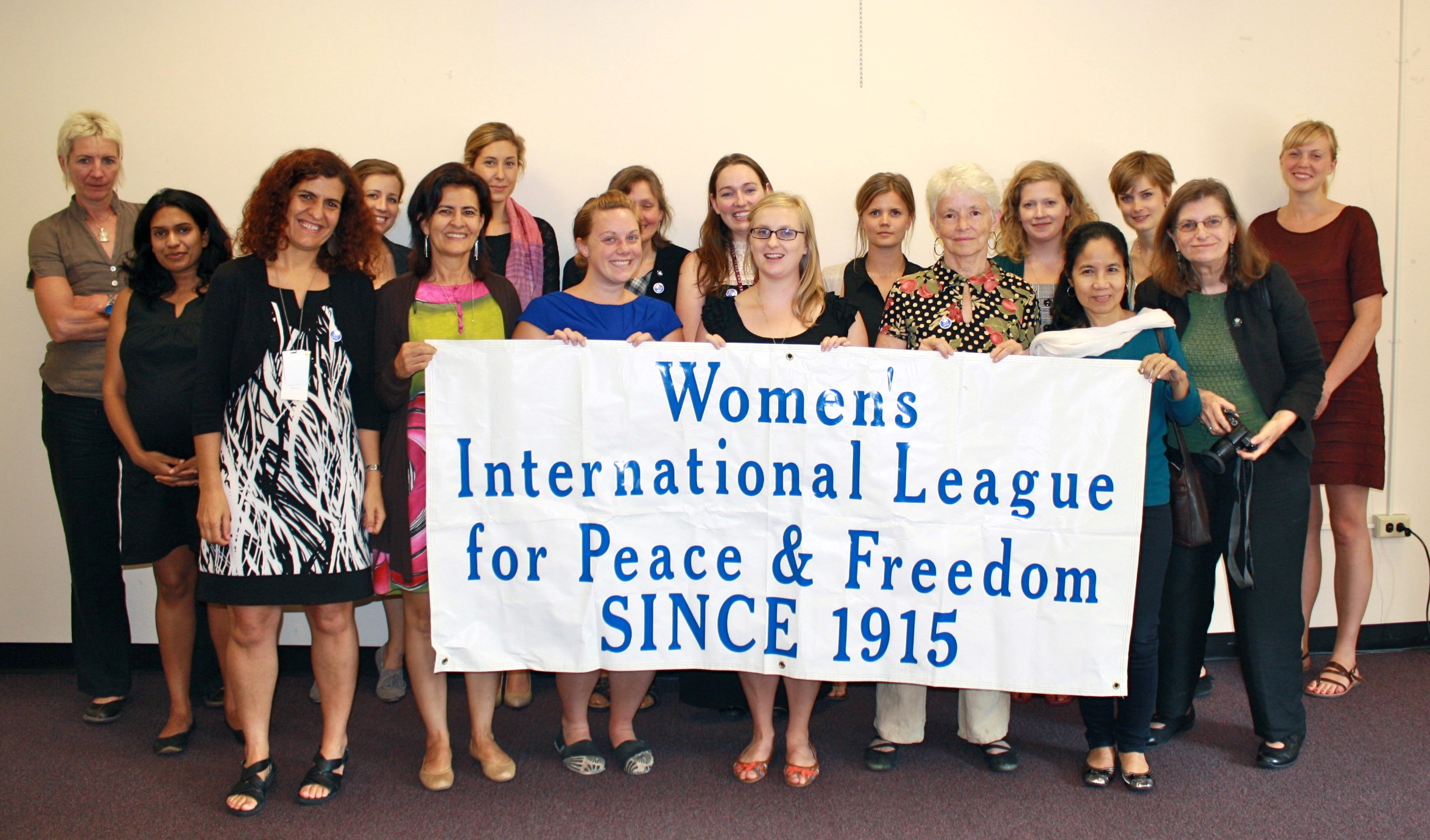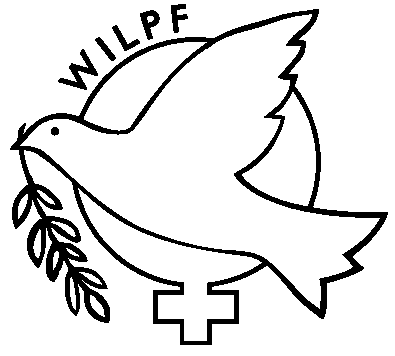Gender and the Arms Trade Treaty
If you have any difficulty reading this newsletter in HTML, please view it online.
July is a very busy month for WILPF and partners as the UN Conference on the Arms Trade Treaty (ATT) negotiations are underway at UN Headquarters. WILPF's team and sections are here in strength and working on various aspects of the ATT, including daily monitoring of developments (sign up here for WILPF's Reaching Critical Will daily ATT Monitor) and advocating for the inclusion of a specific gender criterion in the negotiated text (see our recent Joint Policy Paper on Gender and the Arms Trade Treaty (ATT) with Amnesty International, IANSA, and Religions for Peace. Over a hundred organizations around the world have supported our call for gender focus in the ATT. During the first half of the conference, over 28 Member States have made comments so far supporting reference to gender-based armed violence in the ATT. Iceland has been strongest calling upon other delegates to support adding in text on GBV in all three place: preamble, the goals and objectives and the criteria. See PeaceWomen's Gender & ATT page>>

Madeleine, WILPF Secretary-General, was also here in New York and briefed member states on Tuesday (July 10), spoke at our Side Event on Thursday (July 12) and met officials. WILPF is also organizing a second panel on July 20 (Friday) to discuss the important ways in which two treaties -- the Arms Trade Treaty (ATT) and the Convention on the Elimination of all Forms of Discrimination Against Women (CEDAW) along with the UN Security Council Resolution 1325 et al. can work to prevent discrimination and violence against women, particularly in conflict and post-conflict situations. Several WILPF Sections (Philippines, Spain, Mexico, US, and Sweden) are also in New York and participated in a one-day training session that focused on enhancing the work on a national level concerning arms trade and military expenditure. Read summary and details here>>
I also just finalized a paper on the links between Women, Peace and Security and what I called the two silent “Ps” of the Prevention pillar: Proliferation and Profit. I argue that insufficient attention to conflict prevention promises to perpetuate the downward cycle of violence begetting violence and profits justifying arms sales. I also attempt to present not only challenges but also immediate and long-term opportunities for addressing Proliferation and Profits within the WPS Agenda. In the conclusion, I acknowledge that there is no panacea to address these complex issues; but we must be brave in our work to expose the lies, consistent in the face of conflicting interests, insistent in the face of vested silence, and diligent in our work to propose transformative shifts in policy. (Read paper)
Finally, a special welcome to Ms. Zainab Hawa Bangura, the newly appointed Special Representative of the Secretary-General on Sexual Violence in Conflict. She is the current Minister of Health and Sanitation for the Government of Sierra Leone and replaces Margot Wallström, who held the position for two years. We, in PeaceWomen and WILPF, look forward to continuing our work with the new SRSG to advance prevention of sexual violence (see the recent joint WILPF statement on sexual violence).
Featured in the news this month are articles on the ATT and a selection of news items on recent regional developments, ranging from an update on a promising female politician in South Africa to destructive marriage practices in Pakistan. Featured as resources are two separate papers in which WILPF sections from Finland and Denmark examine the responsibilities of their respective governments and make recommendations vis-a-vis the implementation of SCR 1325 in Afghanistan.
Arms Trade Treaty
WILPF and partners held several special briefings and events during ATT. (See details and summaries)
Hundreds of civil society or ganizations around the world have supported our call for gender focus in the ATT. Thank you all!
ganizations around the world have supported our call for gender focus in the ATT. Thank you all!
WILPF, in our Joint Policy Paper on Gender and the Arms Trade Treaty (ATT) with Amnesty International, IANSA, and Religions for Peace, called for a specific criterion in the treaty to "require states not to authorize an international transfer of conventional arms where there is a substantial risk that the arms under consideration are likely to be used to perpetuate or facilitate acts of gender-based violence, including rape and other forms of sexual violence."
During the first two weeks of the conference, 28 Member States have supported and/or referenced gender-based armed violence.
Comments so far on gender-based armed violence at this ATT conference:
Australia, Austria, Belgium, Botswana, Denmark, Finland, Gabon, Ghana, Holy See, Iceland, Ireland, Kenya, Liberia,  Liechtenstein, Lithuania, Malawi, New Zealand, Norway, Samoa, Senegal, Sierra Leone, South Korea, Sweden, Switzerland, Turkey, United Kingdom and Zambia.
Liechtenstein, Lithuania, Malawi, New Zealand, Norway, Samoa, Senegal, Sierra Leone, South Korea, Sweden, Switzerland, Turkey, United Kingdom and Zambia.
Here is sample of some of the references:
Iceland: "It is vital that the treaty takes this into account and contains a specific gender-based violence criterion to prevent any such violence against women and girls. Accordingly the treaty should require States to not allow an international transfer of conventional arms where there is a substantial risk that the arms under consideration are likely to be used to perpetuate or facilitate acts of gender-based violence, including rape and other forms of sexual violence. To apply this criterion, States must conduct a meaningful assessment of that risk. It is equally important that the criterion acknowledges that both exporting and importing States have joint responsibility in preventing gender-based violence against women."
Finland: "There is indeed a gender dimension to the trade whereby women are disproportionately affected by armed gender-based violence. Therefore, there should be strong references to gender in the treaty text and the criteria in the treaty should address risks of gender-based armed violence."
Gabon says that the ATT should prevent the transfer of weapons that could give rise to sexual violence.
Ghana calls for criteria that takes into account gender-based violence, including rape and other forms of sexual violence.
Keep up to date
Read all information and summaries of WILPF's special events on PeaceWomen's Gender and ATT Page>>
Sign up to receive Reaching Critical Will's ATT Monitor daily through the conference and stay updated ATT Monitor Blog.
Check out which nations are in support of gender-based violence content in the ATT at this online Mapping Database supported by RCW.
Open Debate on the Protection of Civilians in Armed Conflict
On 25 June 2012, the Security Council held an Open Debate on the Protection of Civilians (PoC) in Armed Conflict. The discussion, which pivoted upon the Secretary-General's recent report (S/2012/376) on current challenges to effective PoC, did not result in the adoption of an outcome document. The debate featured 50 statements, including 3 UN officials, a representative of the International Committee of the Red Cross (ICRC), the permanent and non-permanent members of the Council, and 31 other member states. Consistent with the previous Council debate on this issue, approximately 23, or 46% of these statements addressed the gendered dimension of protection of civilians. In anticipation of the upcoming Arms Trade Treaty (ATT) Conference, Austria addressed the critical relationship between arms trade, the protection of civilians, and gender. Austria urged that the ATT should set robust, ambitious, and legally binding standards that prevents transfers if there exists a substantial risk that the weaponry will be used to commit gender-based violence.
Read the full report here.
Recent WILPF Publications
 WILPF-US Fact Sheet on UNSCR 1325, the U.S. National Action Plan and Civil Society Consultations
WILPF-US Fact Sheet on UNSCR 1325, the U.S. National Action Plan and Civil Society Consultations
WILPF International Joint Statement by Femmes Africa Solidarite, WILPF, and World YWCA on Effective Remedies for Conflict Related Sexual Violence
Statement by WILPF on Death Plot Against Human Rights Activist Defender Asma Jahangir
WILPF Regional Conference on the MENA Region in Geneva
 WILPF held a regional conference on the Middle East North Africa (MENA) region in Geneva on June 20-22. The outcome of the presentations was the adoption of a joint statement urging Member States, the UN and international actors to act "Now, not tomorrow" to achieve greater rights and security. In connection with the 20th session of the Human Rights Council (HRC), WILPF also convened a side event. WILPF Secretary-General Madeleine Rees moderated the panel, made up of representatives from Libya, Tunisia, Egypt, Jordan, Lebanon, Yemen and Morocco.
WILPF held a regional conference on the Middle East North Africa (MENA) region in Geneva on June 20-22. The outcome of the presentations was the adoption of a joint statement urging Member States, the UN and international actors to act "Now, not tomorrow" to achieve greater rights and security. In connection with the 20th session of the Human Rights Council (HRC), WILPF also convened a side event. WILPF Secretary-General Madeleine Rees moderated the panel, made up of representatives from Libya, Tunisia, Egypt, Jordan, Lebanon, Yemen and Morocco.
The event opened with a briefing on the conference and featured the moving testimony of Azza Helal Suleiman, an unarmed protester who suffered a brutal beating at the hands of the Egyptian military last year. All participants offered updates on current challenges faced in their own countries and a statement from Iraqi partners, who could not be present, was also read.
